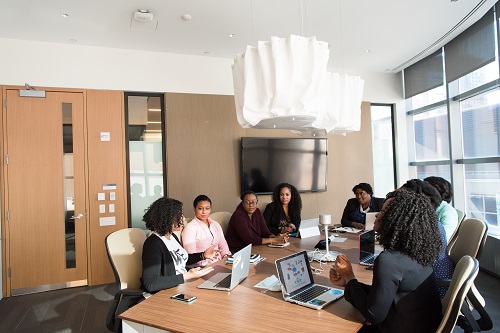This article discusses various types of listening skills, and their usage and importance. Knowledge of these types is a plus point of a professional. They may have to handle such situations which call for a particular manner of understanding and managing. For this purpose they cannot rely on only one type of listening which is what people do naturally. They have to choose some particular style of listening so that they may grasp and comprehend the situation. Only then, there is a possibility of finding a professionally acceptable solution to that situation.
Various situations call for different types of listening skills. The four types of listening skills differ not only in purpose but also in the amount of feedback they entail:

Content Listening
The goal of content listening is to understand and retain information imparted by the speaker. You may ask questions, but basically, information flows from the speaker to you. Your job is to identify the key points of the message, so you concentrate and listen for clues to its structure: previews, transitions, summaries, and enumerated points. Thus you create in your mind, an outline of the speaker’s remarks. Afterwards, you silently review what you have learnt. You may take notes, but you do this sparingly so that you can concentrate on the key points. It doesn’t matter whether you agree or disagree, approve or disapprove.
Critical Listening
The goal of critical listening is to evaluate the message on several levels: the logic of the argument, strength of the evidence, and validity of the conclusions. Similarly, it measures the implications of the message for you and your organization, the speaker’s intentions and motives, and the omission of any important points. But absorbing information and evaluating it at the same time is hard, so hold your judgment until the speaker has finished. Critical listening generally involves interaction as you try to uncover the speaker’s point of view. Hence, you are bound to evaluate the speaker’s credibility as well. For this purpose the nonverbal signals are often your best clue.
Empathic Listening
The goal of empathic listening is to understand the speaker’s feelings, needs, and wants, in order to help solve problem. The message is a vehicle for gaining insight into the person’s psyche. However, your purpose is not really to “solve” the problem. By listening, you help the individual vent the emotions that are preventing him or her from dealing objectively with the problem. You may be tempted to give advice, but don’t. Try not to judge the rightness or wrongness of the individual’s feelings. Just let the other person talk.

Active Listening
It is a technique of listening that is used to help people resolve their differences, but it can be used in nearly any situation. Here is how it works: Before you can reply to another person’s comment with a point of your own, you must restate the ideas and feelings behind the comment to the other person’s satisfaction. You go back and forth this way, until each of you understands the other’s position. The goal is to appreciate the other person’s point of view, where or not you agree.
These types of listening play a central role in professional skills. This enables you to be in a better position to communicate with a purpose. Listening is the biggest tool in the hands of an individual to succeed in an interview. Similarly, it works like a magic rod for problem solution in the hand of a manager. Through the caliber of various types of listening skills, they can gauge the depth of emotions and height of tension in the workplace.
Please feel free to leave your feed back in the comment section if you have any questions or suggestions regarding the types of listening skills. If you like the post, don’t forget to share with your loved ones. Thank You!
Our Social Presence
Facebook:
https://web.facebook.com/ewriter29/
Relevant Post:
https://www.ewriter29.com/skills/communication-skills/barriers-to-effective-listening/




This blog is much nice and is very helpful to me.
Not only helpful for me as well as for anyone.
its very helpful for us…
What is Communication: it is a process of exchanging ideas or information between two or more people with a desire feedback.
What is you Attitude: preparing every message with message receiver in mind.” Try to put yourself in their place before handling any matter related to them. This is called “You Attitude.”
Communication : The imparting or exchanging of information by speaking, writing, or using some other medium.The successful conveying or sharing of ideas and feelings.A communication therefore has three parts: the sender, the message, and the recipient.
You Attitude : The “you” attitude is designed to make the reader feel like were looking at a situation from their perspective. We want to make the reader feel respected and be sensitive to their feelings so that their ego doesn’t get hurt. We also use the “you” attitude to make sure that the reader understands what they are going to gain, instead of focusing on what we will gain.
you have to leave this comment under the articel 7Cs… Lol
COMMUNICATION:
Communication is the exchange of ideas between two or more than two persons , objects or person and objects with a desired feedback. Communication is at least having one sender and one receiver.
YOU ATTITUDE:
•Talking in Favour and interest of the receiver
It means that reader must take care of
Receiver needs and also what has been
done far his/her query is concerned.
•Emphasize Positive and Pleasant Facts
It means reader or sender ask what can be
done to fulfill what they want instead of
what cannot be done.
you are talking about Consideration as a whole. You-attitude is part of Consideration. Through you attitude one can be considerate..!
I like what you guys tend to be up too. This type of
clever work and coverage! Keep up the great works guys I’ve you guys to my blogroll.
Hi there, just became alert to your blog through Google,
and found that it’s really informative. I am going to watch out
for brussels. I’ll appreciate if you continue this in future.
Many people will be benefited from your writing. Cheers!
Its not my first time to go to see this website, i am browsing this site dailly
and obtain pleasant data from here everyday.